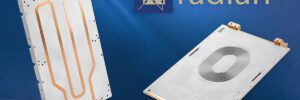
Global logistics and shipping firm DHL has announced plans to accelerate the electrification of its vehicle fleet.
DHL currently operates some 39,000 EVs in pickup and delivery services, representing more than 41% of its fleet. The company plans to raise that proportion to 66% by 2030. New electric trucks and light commercial vehicles are to be deployed across all markets.
The company’s largest sources of emissions are air freight, road transport and facilities. Therefore, the company is investing heavily in technology, renewable energy and sustainable fuels.
“Our emissions peaked in 2021,” said Toby Groom, Global Head of EV Logistics Solutions. “If we want to hit these targets coming down from that 2021 number, we need to reduce our emissions significantly—and we have to have targeted measures to do that.”
“We doubled our electric vehicle fleet between 2021 and 2024,” said Groom. “But this isn’t just about mature markets—we’re rolling out electric vehicles globally. We need structurally sound energy systems to support them, powered by renewable sources, so we’re not shifting emissions from one scope to another.”
Groom acknowledged that electric truck adoption remains challenging: “An electric truck is still two to three times the price of a diesel truck, but that’s early in the evolution.”
DHL is also focusing on sustainable aviation fuels (SAF), as air freight makes up 68% of its total emissions. SAF now represents 3.5% of DHL’s total jet fuel mix. The company has partnered with fuel producers including Neste and Shell to scale production and advocate for stronger policy support.
All new DHL buildings are designed to be carbon-neutral, incorporating solar power, heat pumps, automation, and energy-efficient systems. The company also operates EV Centres of Excellence, including three in Australia, to support fleet electrification, battery recycling and circular economy models.
Looking to 2050, DHL aims to decarbonize all transport modes. The company foresees that aviation will evolve from SAF to hydrogen and battery-electric aircraft. Early electric flight trials are already underway in the US. Shipping will depend on biofuels, methanol and ammonia.
Source: EVinfo
from Charged EVs https://ift.tt/lSeIFb4



No comments:
Post a Comment